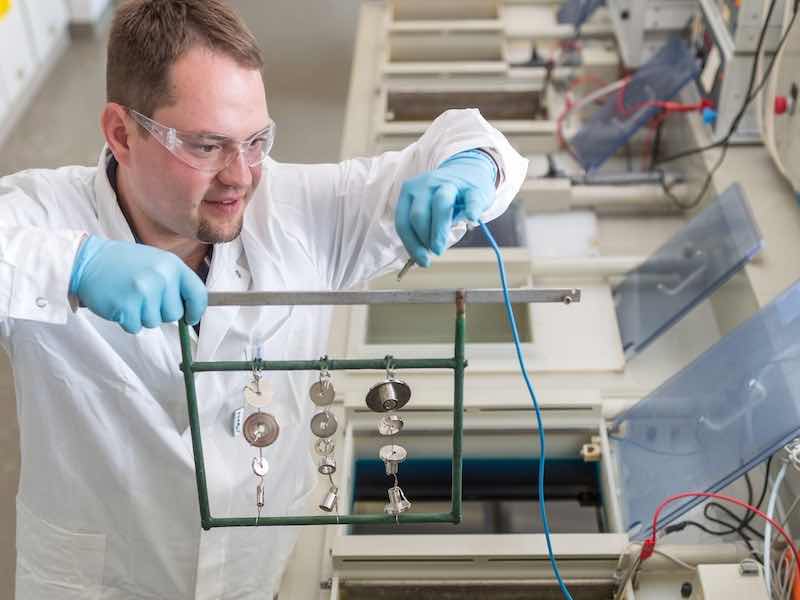A unique collegiate program in Germany is supplying the European market with research and managerial talent in the electrochemistry and electroplating field.
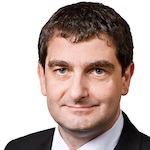 Dr. Andreas BundThe Technische Universität Ilmenau is a German public research university located in Ilmenau, Thuringia, in central Germany, that offers a master’s program in Electrochemistry and Electroplating sciences.
Dr. Andreas BundThe Technische Universität Ilmenau is a German public research university located in Ilmenau, Thuringia, in central Germany, that offers a master’s program in Electrochemistry and Electroplating sciences.
Prof. Dr. Andreas Bund, who is on the faculty of the Electrical Engineering and Information Technology and the Department of Electrochemistry and Electroplating, says the program is aimed at students with a bachelor’s degree in natural sciences, engineering or technology who wish to work on fundamental and applied problems and challenges in the field of electroplating and surface technology.
The four-semester engineering program — which began in 2013 — concludes with the title of Master of Science for students in electrochemistry and electroplating.
Research-Oriented Education
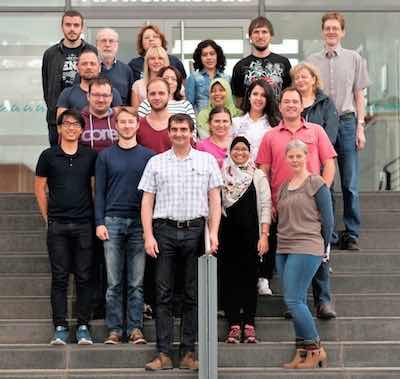 Between five and 10 students take on the graduate program at TU Ilmenau each year.“The program is research-oriented,” Dr. Bund says. “It provides students with the methodological prerequisites to deal with the future-oriented development of new electrochemical processes that consider technical, political, and economic requirements.”
Between five and 10 students take on the graduate program at TU Ilmenau each year.“The program is research-oriented,” Dr. Bund says. “It provides students with the methodological prerequisites to deal with the future-oriented development of new electrochemical processes that consider technical, political, and economic requirements.”
This is additionally promoted by early active participation in research projects as the TU Ilmenau students work closely with the Central Association of Surface Technology (ZVO) and numerous commercial companies in the electroplating and surface technology industry.
“Thus, the needs of the electroplating and surface treatment industry are considered in the best possible way and are directly reflected in the educational profile,” Dr. Bund says.
An important selling point of the master’s program is the lectures offered by renowned speakers from the finishing industry. This essential component of the teaching offer was initiated by the ZVO, which is also involved in the organization of the practical work, such as project work and master’s thesis.
The four semesters are divided into compulsory modules, elective modules, a project thesis with a colloquium, and a master’s thesis. Dr. Bund says the compulsory modules aim at a holistic view of research-oriented electrochemistry and electroplating and impart important scientific and engineering fundamentals.
“Building on this, students learn about electroplating processes, plant technology, as well as electrochemical storage and conversion of energy,” he says.
Program Built on Various Compulsory Modules
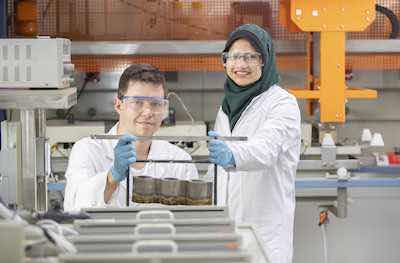 Graduate students do quite a lot of research projects in close collaboration with industry partners. Courtesy of Andreas Heckel.The program comprises the following compulsory modules:
Graduate students do quite a lot of research projects in close collaboration with industry partners. Courtesy of Andreas Heckel.The program comprises the following compulsory modules:
- Chemistry and Analytics
- Electrochemical phase boundaries
- Electrochemical kinetics
- Electrocrystallization
- Applied Electroplating
- Surface technology and Electroplating
- Batteries and Fuel Cells
- Renewable Energy Carriers and Storage Technology
In the elective module on materials science, students deepen their knowledge of electrochemical materials science. TU Ilmenau says interdisciplinary technical and non-technical electives provide students with important core competencies for a successful career and round off the educational profile.
“The program concludes with a project work of about four weeks and a master thesis of six months,” says Stefanie Rexhäuser, who is the marketing director for the Department of Electrochemistry and Electroplating. “Study-accompanying practical work in industrial companies is expressly desired and is actively are actively taught.”
Founded in 1894, TU Ilmenau has five academic departments with about 7,000 students. Teaching and research are focused on the fields of technology and computer science), mathematics, natural sciences, business, and media, in addition to electrochemistry and electroplating.
Careers in Research and Innovation-Oriented Occupational Fields
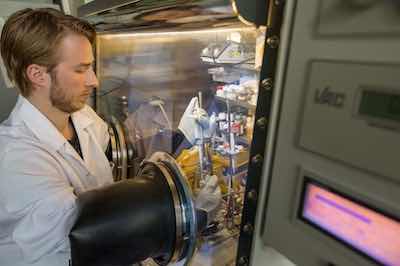 Courtesy TU Ilmenau/Michael ReichelThe school says electrochemistry and electroplating graduates can expect a broad and exciting range of activities in research and innovation-oriented occupational fields. They say the design of the program meets the current and future requirements in basic research, applied research, and industry in the fields of electrochemistry, electroplating, and electrochemical energy technology.
Courtesy TU Ilmenau/Michael ReichelThe school says electrochemistry and electroplating graduates can expect a broad and exciting range of activities in research and innovation-oriented occupational fields. They say the design of the program meets the current and future requirements in basic research, applied research, and industry in the fields of electrochemistry, electroplating, and electrochemical energy technology.
This results in career prospects in many branches of various industries, such as electroplating, automotive, aerospace, metal processing, mechanical and plant engineering, medical technology, electronics, telecommunications, sustainable energy supply, and electromobility industries.
The program is relatively small, as between five and 10 students take on the graduate program at TU Ilmenau each year, but its supporters are hoping to continue growing those numbers.
Graduate students do quite a lot of research projects in close collaboration with industry partners. In past years, the projects included:
- Electrolytes for dark chromium plating
- Nickel plating from alkaline baths
- Electrodeposition of Ni-P multi-layers for wear-resistant surfaces
- Multi-functional zinc coatings
- Photo-electrochemical water treatment
Dr. Bund says industry partners fund a Ph.D. student via employment, fellowship, and other ways. Scientific supervision is done by the department and bilateral projects between industry and TU Ilmenau, where the project sums are between 10,000 and 300,000 Euros. Research projects involving public funding and larger consortia usually are in the order of several hundred thousand Euros.
Trivalent Chromium Plating Study Yields Significant New Research
For example, a recent project on the study of trivalent chromium plating yielding some significant new research, including a better understanding of process parameters such as concentrations of additives and buffers and current density, as well as the correlation between grain size and visual appearance of the layers established.
“The industry partner will use this knowledge to tailor their trivalent chromium processes to produce high-quality bathroom tapware,” Dr. Bund says.
Fundamental and applied electrochemistry has always been an important research subject at German universities. But starting from 1990, TU Ilmenau officials began to see a steady decrease in the number of electrochemistry chairs in Germany.
“When I first heard of this professorship, I thought immediately that this is the position I had always been looking for.”
At the beginning of 2000, there were just very few left. Around 2005, ZVO and DGO decided to endow a Professorship for Electrochemistry and Electroplating at TU Ilmenau.
“The motivation was to lay a solid foundation for the education of specialists in the field of electrochemical surface techniques,” Rexhäuser says.
Rainer Venz, the German Automotive Industry Business Director for supplier MacDermid Alpha Electronics Solutions, says that when Prof. Bund’s predecessor — Professor Christine Jakob — decided to retire several years ago, it was clear that this professorship was essential for the plating industry and needed a succession planning, to prevent the professorship from being ended.
Central Association of Surface Technology (ZVO) Steps Up
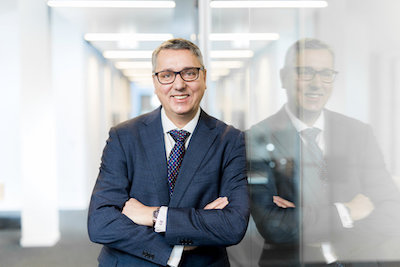 Rainer Venz of MacDermid Alpha Electronics Solutions says the finishing industry in Europe was determined to keep the college program going by hiring Prof. Bund.That is when the ZVO trade association stepped in to help keep it going.
Rainer Venz of MacDermid Alpha Electronics Solutions says the finishing industry in Europe was determined to keep the college program going by hiring Prof. Bund.That is when the ZVO trade association stepped in to help keep it going.
“To ensure that the professorship could be continued — and also to demonstrate the importance for our industry — the ZVO decided to financially support the succession by creating an endowed professorship program for five years,” Venz says.
That is when the beginning of a real partnership between the TU Ilmenau and the ZVO took place, he says. They supported the college program by creating content for the master course, especially for the part of “applied electroplating.”
There is a special scholarship — about 400 Euro each month — granted by the ZVO for up to three students each year.
“That was the beginning of a still ongoing exchange between the academic and industrial world,” Venz says. “The education is now more tailored to the needs of the industry. The advisory board that was established from the beginning is in regular exchange with the professorship and helps permanently to introduce new ideas.”
Dr. Bund says that he was excited to take over the program and wants it to grow even larger. In 2015, TU Ilmenau took over fully funding the endowed professor.
“When I first heard of this professorship, I thought immediately that this is the position I had always been looking for,” he says. “I applied, won the competition, and was appointed in August 2010. Today, more than 10 years later, I am still convinced that that was a unique opportunity for me, and I am very happy to be at TU Ilmenau.”
Developing Necessary Talent Needed in Surface Finishing Industry
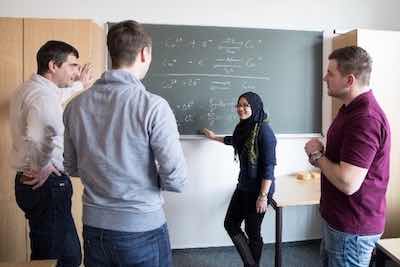 Courtesy TU Ilmenau/Michael ReichelBoth Venz and Dr. Bund agree that the TU Ilmenau program has helped develop the necessary talent needed for the surface finishing industry to thrive in Germany as well as Europe.
Courtesy TU Ilmenau/Michael ReichelBoth Venz and Dr. Bund agree that the TU Ilmenau program has helped develop the necessary talent needed for the surface finishing industry to thrive in Germany as well as Europe.
“The intense connection to the electroplating industry is a special aspect of this professorship,” Dr. Bund says. “We do many application-driven research projects with industrial partners, sometimes bilateral, sometimes in larger consortia. I think our strength is our rigorous scientific approach to real-world challenges.”
Typical examples comprise a better understanding of structure-property-process relationships in trivalent chromium plating processes or tackling the peculiarities of complex corrosion processes and devising strategies to avoid them.
“Often, early career researchers work on such projects in their master’s or Ph.D. theses,” Dr. Bund says. “After their graduation, all our students can choose among several excellent job offers. So, the hope of the German electroplating industry to have a well of well-trained experts has been nicely fulfilled.”
Please visit https://www.tu-ilmenau.de





